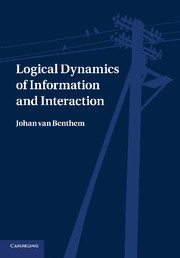Book contents
- Frontmatter
- Contents
- Preface
- Acknowledgments
- 1 Logical dynamics, agency, and intelligent interaction
- 2 Epistemic logic and semantic information
- 3 Dynamic logic of public observation
- 4 Multi-agent dynamic-epistemic logic
- 5 Dynamics of inference and awareness
- 6 Questions and issue management
- 7 Soft information, correction, and belief change
- 8 An encounter with probability
- 9 Preference statics and dynamics
- 10 Decisions, actions, and games
- 11 Processes over time
- 12 Epistemic group structure and collective agency
- 13 Logical dynamics in philosophy
- 14 Computation as conversation
- 15 Rational dynamics in game theory
- 16 Meeting cognitive realities
- 17 Conclusion
- References
- Index
6 - Questions and issue management
Published online by Cambridge University Press: 07 October 2011
- Frontmatter
- Contents
- Preface
- Acknowledgments
- 1 Logical dynamics, agency, and intelligent interaction
- 2 Epistemic logic and semantic information
- 3 Dynamic logic of public observation
- 4 Multi-agent dynamic-epistemic logic
- 5 Dynamics of inference and awareness
- 6 Questions and issue management
- 7 Soft information, correction, and belief change
- 8 An encounter with probability
- 9 Preference statics and dynamics
- 10 Decisions, actions, and games
- 11 Processes over time
- 12 Epistemic group structure and collective agency
- 13 Logical dynamics in philosophy
- 14 Computation as conversation
- 15 Rational dynamics in game theory
- 16 Meeting cognitive realities
- 17 Conclusion
- References
- Index
Summary
By now, our logical dynamics of agents can deal with their observations and inferences. But the examples in our Introduction crucially involved one more informational act. The waiter in The Restaurant asked questions to get the relevant information, the father in the Muddy Children asked questions to direct the conversation, and questions were behind many other scenarios that we discussed. So far, we just looked at the information provided by answers. But questions themselves are just as important as statements in driving reasoning, communication, and investigation: they set up an agenda of issues that directs information flow, and makes sense of what takes place. It has even been said that all of science is best viewed as a history of questions, rather than of answers. In this chapter, we will see how this agenda setting fits into our approach. We follow our usual set-up with static logics, dynamic actions and logics, and an ‘opt-out point’ for the reader who has seen enough – listing some further directions afterwards.
Logics of questions
The idea that questions are basic logical acts goes back to Ajdukiewicz in the 1930s, sparking work in Poland in the 1960s (Wisniewski 1995). A defender of this view since the 1970s has been Hintikka, who shows how any form of inquiry depends on an interplay of inference and answers to questions, resulting in the interrogative logic of Hintikka et al. (2002). These logics are mainly about general inquiry and learning, with relations to epistemology and philosophy of science. But there is also a stream of work on questions in natural language, as basic speech acts with a systematic vocabulary (cf. Ginzburg 2009; Groenendijk & Stokhof 1997, and the ‘inquisitive semantics’ of Groenendijk 2008). Logic of inquiry and logic of questions are related, but there are differences in thrust. A study of issue management in inquiry is not necessarily one of speech acts that must make do with the expressions that natural language provides.
- Type
- Chapter
- Information
- Logical Dynamics of Information and Interaction , pp. 114 - 129Publisher: Cambridge University PressPrint publication year: 2011



